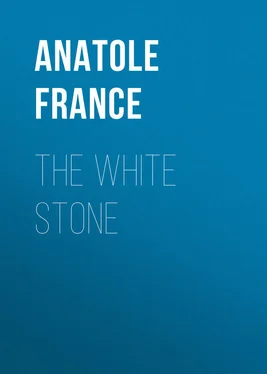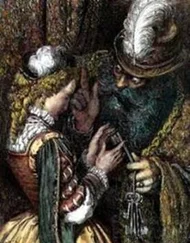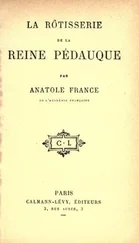Anatole France - The White Stone
Здесь есть возможность читать онлайн «Anatole France - The White Stone» — ознакомительный отрывок электронной книги совершенно бесплатно, а после прочтения отрывка купить полную версию. В некоторых случаях можно слушать аудио, скачать через торрент в формате fb2 и присутствует краткое содержание. Жанр: foreign_antique, foreign_prose, на английском языке. Описание произведения, (предисловие) а так же отзывы посетителей доступны на портале библиотеки ЛибКат.
- Название:The White Stone
- Автор:
- Жанр:
- Год:неизвестен
- ISBN:нет данных
- Рейтинг книги:4 / 5. Голосов: 1
-
Избранное:Добавить в избранное
- Отзывы:
-
Ваша оценка:
- 80
- 1
- 2
- 3
- 4
- 5
The White Stone: краткое содержание, описание и аннотация
Предлагаем к чтению аннотацию, описание, краткое содержание или предисловие (зависит от того, что написал сам автор книги «The White Stone»). Если вы не нашли необходимую информацию о книге — напишите в комментариях, мы постараемся отыскать её.
The White Stone — читать онлайн ознакомительный отрывок
Ниже представлен текст книги, разбитый по страницам. Система сохранения места последней прочитанной страницы, позволяет с удобством читать онлайн бесплатно книгу «The White Stone», без необходимости каждый раз заново искать на чём Вы остановились. Поставьте закладку, и сможете в любой момент перейти на страницу, на которой закончили чтение.
Интервал:
Закладка:
“Thus it came about that our first parents were composed of ill-assorted pieces which did not harmonise. And, having mated by choice or at haphazard, they produced beings as incoherent as themselves. Thus has it come about, through the Titan’s fault, that we see so many virile women and so many effeminate men. This also explains the contradictory characteristics to be met with in the firmest of minds and how it is that the most determined character is perpetually false to itself. And, finally, this is why we are all at variance with our own selves.”
Lucius Cassius expressed condemnation of this fable, because it did not teach man to conquer himself, but on the contrary induced him to yield to nature.
Gallio pointed out that the poets and philosophers gave a different interpretation as to the origin of the world and the creation of mankind.
“The fables told by the Greeks,” he said, “should not be believed in too blindly, nor should we hold as truthful, Apollodorus, what they state in particular concerning the stones thrown by Pyrrha. The philosophers are not in accord among themselves as to the principle presiding over the creation of the world, and leave us in doubt as to whether the earth was produced by water, by air, or, as seems more credible, by the subtile heat. But the Greeks wish to know all things, and so they forge ingenious falsehood. How much better it is to confess our ignorance. The past is as much concealed from us as is the future; we are circumscribed by two dense clouds, in the forgetfulness of what was, and in the uncertainty of what shall be. And yet we suffer ourselves to be the playthings of an inquisitive desire to become acquainted with the causes of things, and a consuming anxiety incites us to ponder over the destinies of mankind and of the world.”
“It is true,” sighed Cassius, “that we are everlastingly striving to penetrate the impenetrable future. We toil at this quest with all our might, and call to our aid all kinds of means. Anon we think to attain our object by meditation; again, by prayer and ecstasy. Some of us consult the oracles of the gods; others, fearing not to do that which is forbidden, appeal to the augurs of Chaldæa, or try the Babylonian spells. Futile and sacrilegious curiosity! For, of what advantage would be to us the knowledge of future things, since they are inevitable! Nevertheless the wise men, still more so than the vulgar herd, feel the desire of delving into the future and of, so to speak, hurling themselves into it. It is doubtless because they hope thus to escape the present which inflicts on them so much that is sad and distasteful. Why should not the men of to-day be goaded with the desire of fleeing from these wretched times? We are living in an age replete with deeds of cowardice, abounding in ignominious acts, and fertile in crimes.”
Cassius spoke at some length in depreciation of the times in which he lived. He lamented the fact that the Romans, fallen from their ancient virtues, no longer found any pleasure except in the consumption of the oysters of the Lucrine lake and of the birds of Phasis river, and that they had no taste except for mummers, chariot-drivers, and gladiators. He deplored the ills which the Empire was suffering from, the insolent luxury of the great, the contemptible avidity of the clients, and the savage depravity of the multitude.
Gallio and his brother agreed with him. They loved virtue. Nevertheless, they had nothing in common with the patricians of old who, having no other care than the fattening of their swine, and the performance of the sacred rites, conquered the world for the better administration of their farms. This nobility of the byre, instituted by Romulus and Remus, was long since extinct. The patrician families created by the divine Julius and by the Emperor Augustus, had passed away. Intelligent men from all the provinces of the Empire had stepped into their places. Romans in Rome, they were nowhere strangers. They greatly surpassed the old Cethegus family by their refined minds and humane feelings. They did not regret the Republic; they did not regret liberty, the recollection of which recalled simultaneously proscriptions and civil wars. They honoured Cato as the heroic figure of another age, without wishing to see so exalted a type of virtue arise on top of fresh ruins. They looked upon the Augustan epoch and the first years of Tiberius as the happiest the world had ever known, since the Golden Age had existed in the imagination of the poets only. They lamented the fact that the new order of things, which had promised the world a long reign of felicity, should have so promptly burdened Rome with an unheard of shame unknown even to the contemporaries of Marius and Sulla. They had, during the madness of Caius, seen the best citizens branded with a hot iron, sentenced to the mines, to labour on the roads, thrown to wild beasts, fathers compelled to be present at the agony of their children, and men shining by their virtues, such as Cremutius Cordus, suffer themselves to die of starvation, in order to cheat the tyrant of their death. To Rome’s shame, be it said, Caligula respected neither his sisters nor the most illustrious dames. And, what filled these rhetors and philosophers with as great an indignation as the one they felt over the rape of the matrons and the assassination of the best citizens, were the crimes perpetrated by Caius against eloquence and letters. This madman had conceived the idea of destroying the poems of Homer, and had caused to be removed from all bookshelves the writings, the portraits, and the names of Virgil and of Livy. Finally, Gallio could not forgive him for having compared the style of Seneca to mortar without cement.
They dreaded Claudius in a somewhat lesser degree, but despised him the more for all that. They ridiculed his pumpkin-like head and his seal-like voice. That old savant was not a monster of wickedness. The worst they could reproach him with was his weakness. But, in the exercise of the sovereign power, such weakness became at times as cruel as the cruelty of Caius. They also bore domestic grievances against him. If Caius had held Seneca up to ridicule, Claudius had banished him to Corsica. It is true that he had subsequently recalled him to Rome and conferred a prætorship on him. But they showed him no gratitude for having thus carried out the behests of Agrippina, in ignorance of what he was commanding. Indignant but long suffering, they left it to the Empress to determine the fate of the aged man, and the choice of the new prince. Many rumours were current to the shame of the unchaste and cruel daughter of Germanicus. They heeded them not, and sang the praises of the illustrious woman to whom the Senecas owed the termination of their misfortune and their rise in honours. As will oftentimes happen, their convictions were in harmony with their interests. A painful experience of public life had left unshaken their trust in the régime established by the divine Augustus, a régime placed on a firmer basis by Tiberius, and under which they filled high positions. They were reckoning on a new master to redress the evils engendered by the masters of the Empire.
Gallio produced from the folds of his toga a roll of papyrus.
“Dear friends,” he said, “I have learnt this morning, through letters from Rome, that our young prince has married Octavia, the daughter of Cæsar.”
A murmur of approval greeted the news.
“We should indeed,” continued Gallio, “congratulate ourselves over a union, by virtue of which the prince, combining with his former qualifications those of husband and of son-in-law, becomes henceforth the equal of Britannicus. My brother Seneca never ceases praising in his letters to me the eloquence and gentleness of his pupil who sheds lustre on his youth by pleading before the Senate in the presence of the Emperor. He has not yet completed his sixteenth year, yet he has already won the cases of three unfortunate or guilty cities – Ilion, Bolonia, and Apamea.”
Читать дальшеИнтервал:
Закладка:
Похожие книги на «The White Stone»
Представляем Вашему вниманию похожие книги на «The White Stone» списком для выбора. Мы отобрали схожую по названию и смыслу литературу в надежде предоставить читателям больше вариантов отыскать новые, интересные, ещё непрочитанные произведения.
Обсуждение, отзывы о книге «The White Stone» и просто собственные мнения читателей. Оставьте ваши комментарии, напишите, что Вы думаете о произведении, его смысле или главных героях. Укажите что конкретно понравилось, а что нет, и почему Вы так считаете.










